A self-evaluation is a powerful tool that holds you accountable for your strengths, weaknesses, growth and development.
In many circumstances, a well-written self-evaluation is the best way to convey what you’re doing well and how you can improve.
But writing a great self-evaluation is easier said than done, isn’t it?
Some people struggle with being honest. They want to keep the mask of deceit on and make themselves look good for their manager, so they’re not entirely truthful about some or all of the areas where they need help.
On the other hand, some struggle with being too humble. They want to show their dedication to improvement, so they fill their self-evaluations with weaknesses to overcome rather than achievements to celebrate.
Or perhaps you know your strengths and weaknesses, but when it comes time to write everything down, your mind goes blank.
(If that’s you, I’m glad I’m not the only one!)
Thankfully, you’re in the right place. My goal is that you can take inspiration from the 112 examples in this article and learn how to write a self-evaluation that is honest, detailed and actionable.
Key Takeaways
- Self-evaluations must be truthful, detailed and practical in order to be effective.
- They aid you in setting realistic development goals and clarify the path you’ll take to achieve them.
- You will rarely find a person who is consistently going and growing that hasn’t taken time to reflect on the past and plan for the future (a.k.a done a self-evaluation).
Self-Evaluation Examples
In my experience, the best self-evaluations have depth, transparency and constructive self-reflection.
It’s neither about outlining all your accomplishments nor listing your pitfalls since your last review.
Instead, it’s an opportunity to delve into your contributions to the company and your areas for improvement. An honest evaluation reflects on the challenges you’ve faced, lessons you’ve learned and what you’re doing now and in the future to refine yourself as a human and employee.
Since the best self-evaluations offer room for accomplishment and development, the evaluation examples below offer both types of responses.
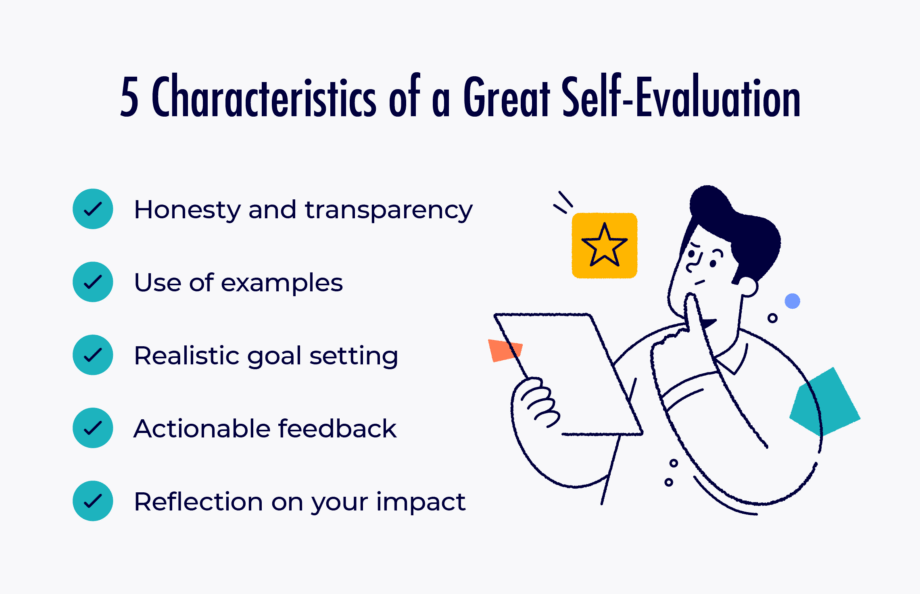
Communication Examples
Communication is essential in any workplace (and will likely be evaluated in your reviews).
When you think about communication, you likely think of how you converse with others. But don’t forget to review your nonverbal communication skills, written communication and other ways you may build working relationships with others.
Phrases of Accomplishment
- “My written communication is timely and well-written. My coworkers and clients know they can rely on me to respond to their messages promptly. If I find myself in a meeting or another situation where I cannot respond right away, I will make others aware of it through my status and email auto-reply.”
- “My communication created a collaborative environment during project X, leading to…”
- “I demonstrate strong, active listening skills during client meetings, resulting in a deeper understanding of my client’s perspectives and needs.”
- “I routinely conduct well-organized meetings and presentations to deliver essential information that resonates with my team and leads them to take action.”
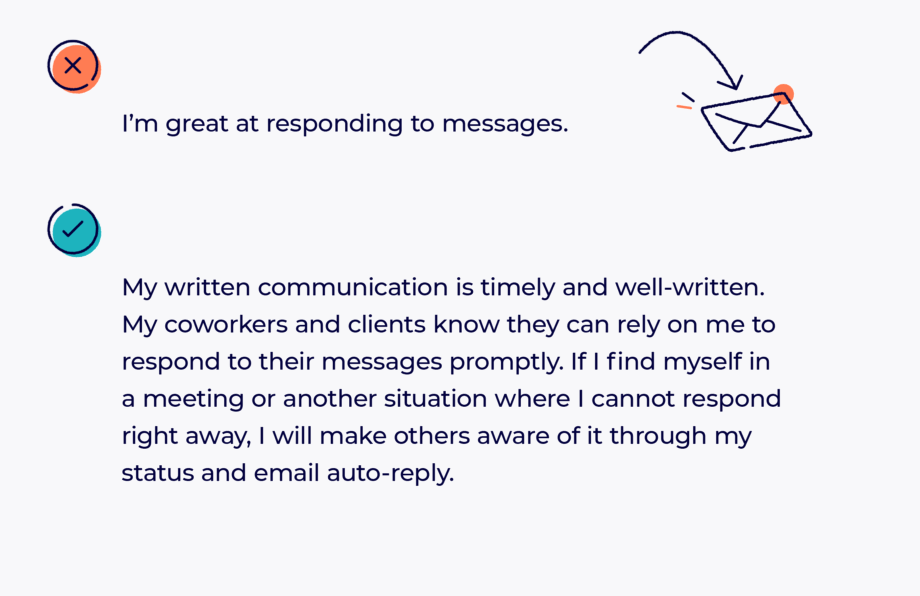
Phrases of Improvement
- “I want my nonverbal communication to reflect that I am actively listening when I am in meetings. I am working on making more eye contact with speakers. I am also working on withholding my thoughts until the speaker has completed their presentation and is ready for questions and suggestions.”
- “In some instances, I may have assumed others understood my perspective without seeking confirmation, leading to communication gaps in projects. To prevent this, I will leave extra time in meetings for further questions and clarification.”
- “I have been told that my body language doesn’t always reflect that I am listening in meetings. I will work on my nonverbal communication skills to reflect that I am actively listening.”
- “I often have a hard time adapting my communication style to different audiences. I plan to work on tailoring my communication to individuals and teams accordingly.”
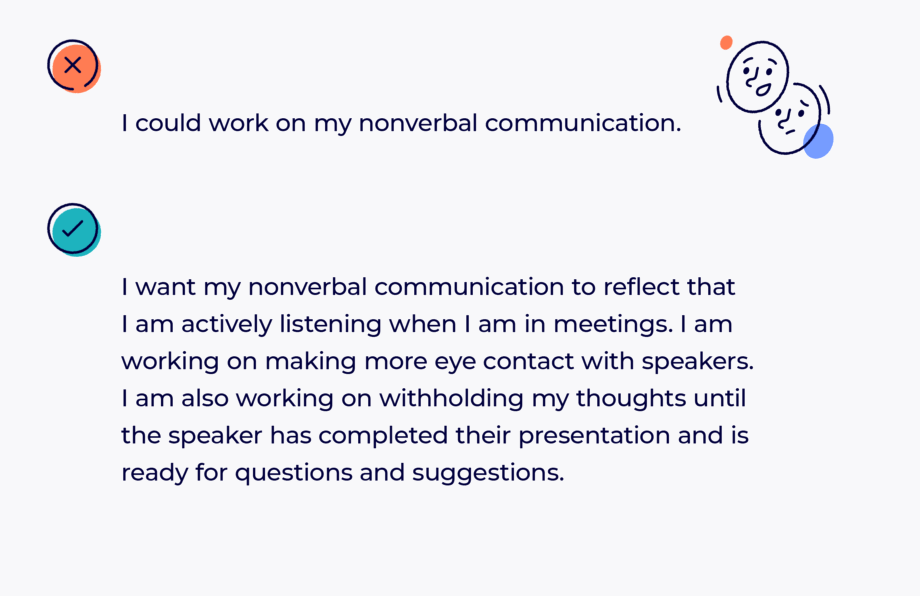
Technical Skills Examples
Your technical skills are one of the top things that your self-evaluations should feature.
Remember to call out those skills by name and be specific about how you grew (or want to grow) your knowledge in them.
Phrases of Accomplishment
- “I’ve been completing training in my spare time, so now I have a greater understanding of the software we use, and I am eager to share my knowledge with others.”
- “My ability to troubleshoot and resolve complex technical issues regarding project X was a key factor in meeting tight deadlines and ensuring project success.”
- “I took the initiative to mentor team members in coding with X software. I fostered a culture of continuous learning within the team by sharing my expertise.”
- “I effectively collaborated with cross-functional teams, translating technical jargon into clear and accessible language for non-technical stakeholders, facilitating smoother communication.”
Phrases of Improvement
- “I am struggling to understand the new process for inputting data. I plan to reach out to a peer to teach and assist me.”
- “I am committed to improving my coding efficiency by writing cleaner and more modular code, which will contribute to projects getting completed faster.”
- “My writing skills have improved, but I know that I can improve my grammar and proofreading. I plan to reach out to one of our editors for a one-on-one training session.”
- “I understand the importance of documentation in technical projects, and I am working to improve my clarity and comprehensiveness by implementing the feedback I received and augmenting my own work with helpful AI tools.”
Reliability Examples
You are what you repeatedly do.
The best employees are reliable and take ownership of their work. So, your managers and team members need to be able to rely on you to follow through with work that meets or exceeds expectations and is on time or ahead of schedule.
While writing your review, share examples of times when you were able to step up and be a dependable employee. Bonus points if you can call out those times where you went above and beyond on a project you weren’t originally assigned to!
Phrases of Accomplishment
- “I consistently met or exceeded deadlines, demonstrating a high level of dependability in completing tasks and projects.”
- “During periods of high workload, I effectively prioritized tasks and maintained a consistent level of productivity, preventing delays in project timelines.”
- “I was proactive in anticipating potential challenges and took preventative measures to ensure the smooth execution of projects, earning the trust of my team.”
- “My colleagues and supervisors could rely on me to follow through on commitments.”
Phrases of Improvement
- “Sometimes I feel overwhelmed with my workload, so I am rarely available for other projects and meetings. I am working on better managing my time to be more available.”
- “I am actively improving my communication skills about potential delays to ensure that the team is informed and can adjust expectations accordingly.”
- “I recognize that consistency is key to reliability, and I’m focused on maintaining a steady level of performance even during busy periods.”
- “I am seeking feedback from colleagues to identify areas where I can enhance my reliability and am committed to continuously improving this aspect of my work.”
Flexibility Examples
Projects rarely start and finish according to the original plan, so I recommend honing your ability to be flexible.
If you notice a “flexibility” section on a self-review, reflect on the times you were required to adapt to an extenuating circumstance and how you reacted to it.
Phrases of Accomplishment
- “During the holidays, we have periods of high workload. Thankfully, I was able to manage my time and resources to meet changing demands, maintaining a high level of productivity.”
- “I effectively collaborated with team members with different working styles, fostering a flexible and inclusive environment that allowed for diverse approaches to problem-solving.”
- “I demonstrated adaptability during project X by successfully adjusting the project scope and requirements to better suit the needs of the client. Through communication and schedule adjustments, I was able to ensure the team’s continued progress.”
- “In response to unexpected changes, I willingly took on new responsibilities that my teammates could not. By adjusting my priorities, I was able to support the team’s goals.”
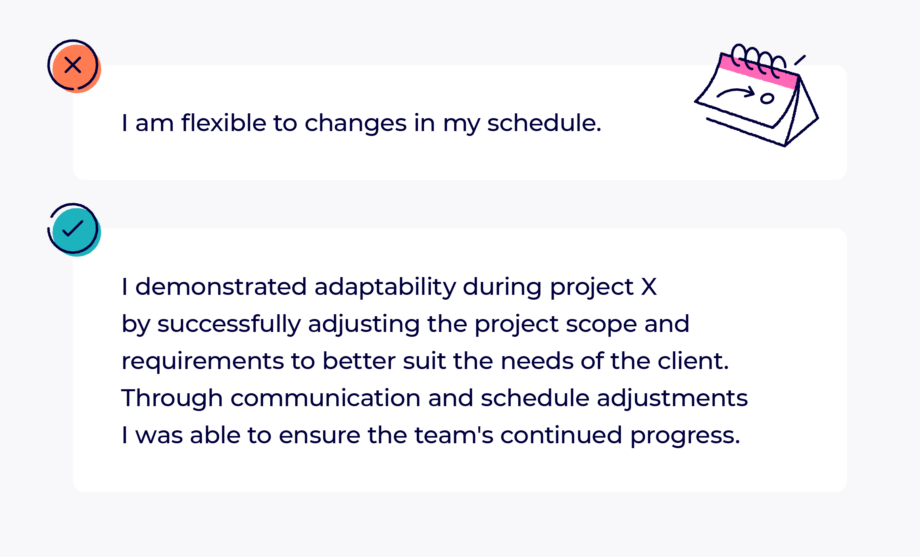
Phrases of Improvement
- “I am aware that I could benefit from being more open to alternative solutions and perspectives, and I am making a conscious effort to embrace different approaches to problem-solving.”
- “I understand the importance of being more proactive in anticipating changes, and I am working on developing a mindset that welcomes and prepares for unforeseen challenges.”
- “I recognize that my resistance to change may have affected team dynamics. I am taking steps to cultivate a more adaptable and collaborative mindset.”
- “I recognize that my preference for routine may hinder my ability to be flexible, and I am open to hearing feedback and ideas about how I can embrace a more adaptable work style similar to that of my team members.”
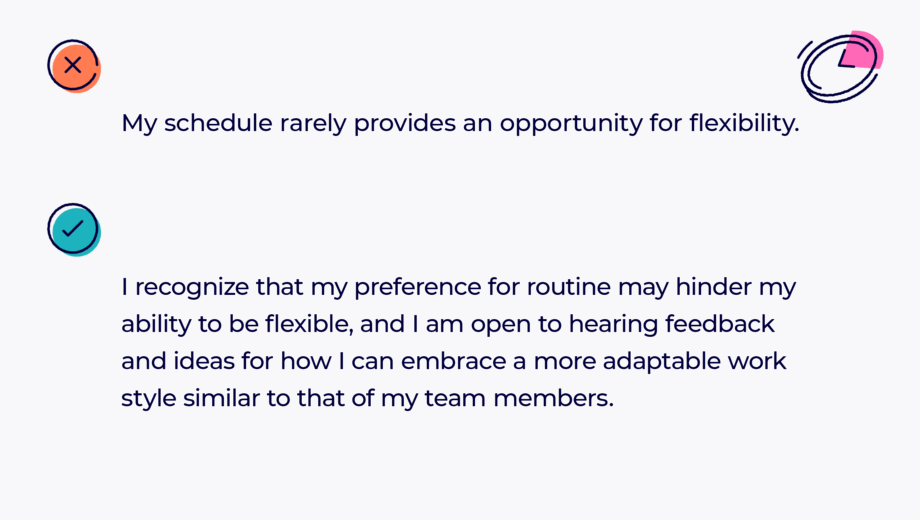
Development Examples
Whether it’s leadership, skill or career development, your manager wants to see you taking steps to grow and develop yourself into a better individual, employee and leader.
Think about what you’ve done to develop yourself and share your experiences and outcomes in your evaluation.
Phrases of accomplishment
- “I invest about one hour of my time developing my technical skills each week.”
- “I proactively sought opportunities for leadership development, successfully acquiring and applying new skills that enhanced my contributions to the team.”
- “I demonstrated a strong commitment to lifelong learning by attending relevant workshops, webinars and training sessions, continuously expanding my skill set.”
- “I took the initiative to network with colleagues who excel in specific areas, accelerating my learning curve and contributing to a knowledge-sharing culture.”
Phrases of improvement
- “I am working on improving my time management to allocate dedicated time for professional development amidst my regular workload.”
- “I acknowledge that I may have been hesitant to step outside my comfort zone, and I am actively seeking ways to embrace challenges that will facilitate skill growth.”
- “I understand the importance of setting specific goals for skill development, and I am developing a structured plan to track my progress and achievements in this area.”
- “I am seeking guidance from my mentors and colleagues to identify areas where I can focus my efforts for the most impactful career development.”
Collaboration Examples
Not a day goes by when you don’t have the opportunity to collaborate with others in the workplace.
Chances are, your managers want to see you take advantage of the great minds around you and include others on projects where appropriate.
Think about one or two times you effectively collaborated with one or more coworkers to go above and beyond expectations.
Phrases of Accomplishment
- “I enjoy taking on new projects that require working with my peers. When I work with my team, I know we will create a great finished product.”
- “I facilitated productive meetings and brainstorming sessions, creating an inclusive space where team members felt comfortable sharing their ideas.”
- “I willingly shared my expertise with colleagues, contributing to a culture of knowledge-sharing and mutual support.”
- “I fostered a collaborative environment by actively seeking input from team members and incorporating diverse perspectives into our projects.”
Phrases of Improvement
- “I have a hard time collaborating with my team members, and I sometimes feel that I can get my work done faster if I do it myself. However, I understand the importance of different perspectives, so I am learning to embrace teamwork. Even if it takes longer, I know the end product will be better for it.”
- “I recognize that there were instances where I could have been more proactive in looking for collaboration opportunities, and I am working on being more attentive to potential ways to partner with others.”
- “I am actively improving my communication skills to ensure that my ideas are conveyed clearly and comprehensively during collaborative discussions.”
- “I acknowledge that there were occasions where I may have unintentionally dominated discussions, and I am working on creating more space for my colleagues to contribute.”
Initiative Examples
While completing your core tasks come first, your leaders also want to see that you’re a self-starter.
In fact, in my companies, resourcefulness (taking initiative) is one of the top traits I look for in both new hires and promotion potential.
Whether that looks like taking charge of a project, mentoring a fellow teammate or finding ways to improve processes, document examples of ways you took initiative and experienced the result of your resourcefulness.
Phrases of Accomplishment
- “I have consistently demonstrated a proactive approach to my work by identifying opportunities for process improvement and sharing my ideas with team leaders.”
- “I willingly volunteered for additional projects, showcasing my commitment to the success of the team and the organization.”
- “I actively contributed ideas during team discussions and meetings, showing a proactive mindset in problem-solving and decision-making.”
- “I demonstrated a proactive approach by identifying areas for improvement and implementing innovative solutions without waiting for direction.”
Phrases of Improvement
- “While I have taken the lead in individual projects, I recognize the need to enhance my ability to delegate tasks and empower team members.”
- “I am committed to improving my time management skills to better allocate time for proactive initiatives amidst my regular workload.”
- “I am seeking mentorship and guidance to identify areas where I can contribute more effectively and take the initiative in projects that align with my skills and interests.”
- “I am working on enhancing my confidence to take the initiative in situations where I might have hesitated in the past.”
Client Relations Examples
You’ll likely see this field on your self-evaluation if you’re in a client-facing position, since client relations are essential to business operations.
When writing your responses, call out specific clients and projects that were successful due to your ability to maintain a great relationship.
Phrases of Accomplishment
- “On the few occasions when my clients were unsatisfied with our work, I quickly rectified the situation by listening to their feedback, revising the deliverable and taking notes for future reference.”
- “I demonstrated excellent communication skills, ensuring that clients were well-informed about project progress and any potential challenges.”
- “I actively sought client feedback and utilized it to make improvements, showing a commitment to providing exceptional service.”
- “I successfully managed client expectations by setting clear and realistic timelines, resulting in increased satisfaction and trust.”
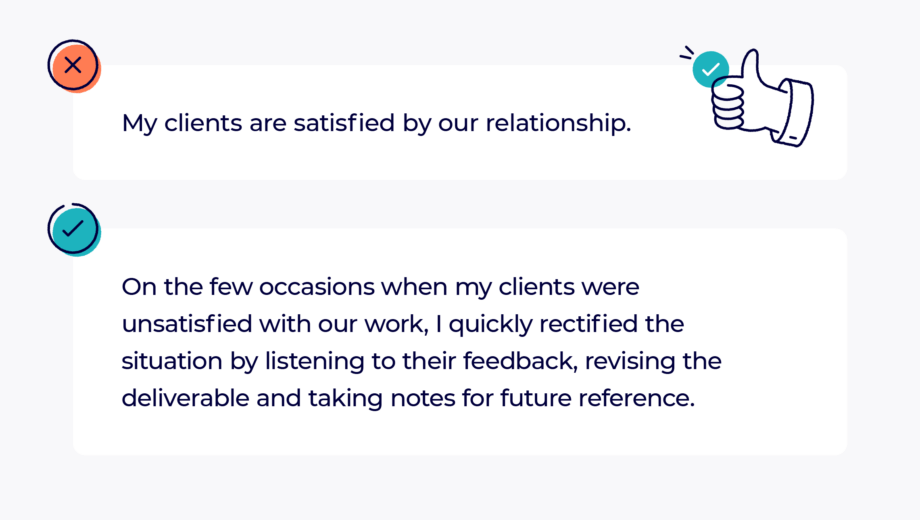
Phrases of Improvement
- “While I have effectively managed existing client relationships, I acknowledge that I need to invest more time in expanding our client base.”
- “I recognize that there were instances where I could have been more proactive in anticipating and addressing client concerns. I am actively working on enhancing my foresight in this area by checking in with my clients more often and asking thought-provoking questions.”
- “I am seeking additional training in conflict resolution to better handle challenging situations and maintain positive client relationships even in difficult circumstances.”
- “I acknowledge the need to provide more detailed and comprehensive updates to clients, and I am implementing strategies to enhance the transparency and clarity of my communication.”
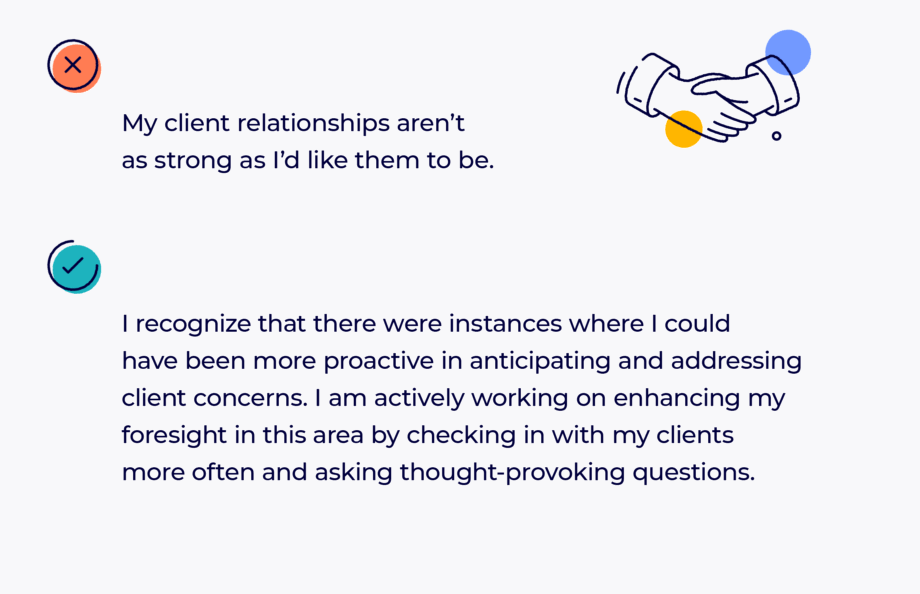
Timeliness of Work Examples
Demonstrating a commitment to timely completion of tasks shows high personal integrity and impeccable organizational skills.
In your evaluation, highlight instances where you met deadlines, or list the challenges that prevented you from reaching them.
Phrases of Accomplishment
- “I consistently meet project deadlines by prioritizing important tasks and improving my time management.”
- “I actively communicated with team members to coordinate timelines and expectations, contributing to a well-organized workflow.”
- “I implemented efficient time management strategies, allowing me to handle multiple tasks simultaneously without sacrificing the quality of my work.”
- “I consistently delivered work ahead of schedule, allowing ample time for revisions and improvements, which positively impacted project outcomes.”
Phrases of Improvement
- “I occasionally struggle with time estimation, which can lead to overcommitting and missing deadlines. I am working to improve this by picking out certain tasks that I should place a time limit on. This way, I can move through my day without dwelling on unimportant tasks.”
- “I am implementing strategies to better prioritize tasks, ensuring that I allocate sufficient time to critical projects to meet deadlines more consistently.”
- “I acknowledge the importance of setting realistic timelines, and I am working on creating more accurate estimates for task completion.”
- “I understand the need for proactive communication when facing challenges that may impact deadlines, and I am working to enhance my communication in such situations.”
Creativity Examples
I’ve seen creativity drive problem-solving and innovation in multiple workplaces.
As you contemplate your creativity usage, emphasize instances where your unique thinking led to solutions that positively impacted the project or organization.
If you feel you’re lacking creativity, provide some details of things you feel could be improved with some out-of-the-box thinking.
Phrases of Accomplishment
- “I actively contribute to a culture of creativity by encouraging out-of-the-box thinking in team discussions.”
- “I actively sought out opportunities to infuse creativity into my work, resulting in unique and impactful outcomes that surpassed expectations.”
- “I fostered a culture of creativity within the team by encouraging diverse perspectives and brainstorming sessions that led to breakthrough ideas.”
- “I contributed to a more visually appealing and engaging work environment by incorporating creative elements into presentations, reports and other deliverables.”
Phrases of Improvement
- “I am working on stepping out of my comfort zone to explore new approaches and techniques that can enhance the creative aspects of my work.”
- “I understand the value of collaboration in fostering creativity, and I am actively seeking more opportunities to exchange ideas with colleagues to spark innovation.”
- “I acknowledge that there were instances where I may have been too risk-averse in my approach, and I am working on embracing a more experimental mindset to fuel creativity.”
- “While I haven’t been the most creative in the past, I am trying to develop unique ideas for improving strenuous processes like data analysis. I feel confident that I can use my creative thinking skills to speed up this process.”
Problem-Solving Skills Examples
Your problem-solving skills are critical for navigating and achieving success in challenging situations.
As you respond to these hard questions about problem-solving skills, ponder times when you proactively identified issues and found long-term solutions.
Phrases of Accomplishment
- “I am skilled at thinking on my feet and adapting to unexpected challenges, like when a team member was out sick, and I reevaluated my team’s schedules so we could still meet our strict deadline.”
- “I successfully identified root causes of issues, allowing for targeted and sustainable solutions rather than quick fixes.”
- “I actively collaborated with team members to brainstorm and implement innovative solutions to complex problems.”
- “I demonstrated adaptability by quickly adjusting my problem-solving approach when faced with unexpected obstacles.”
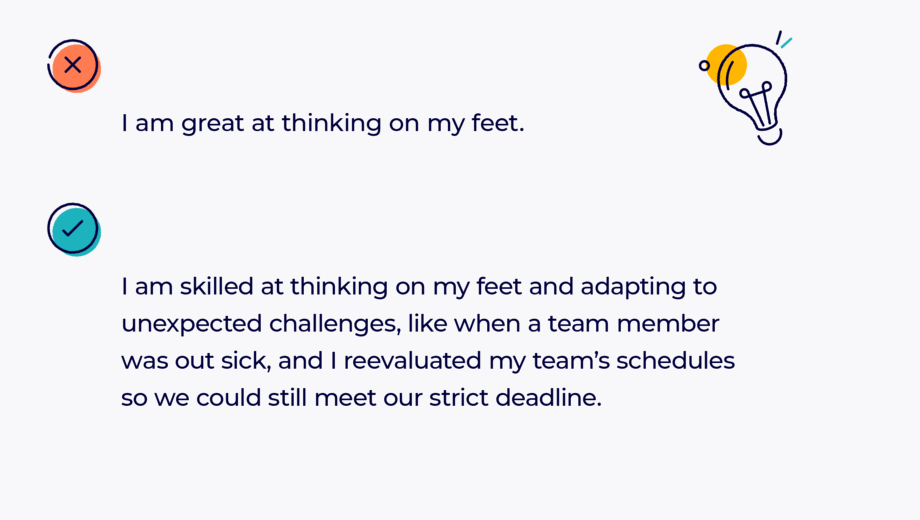
Phrases of Improvement
- “I occasionally struggle with involving a broader range of perspectives when tackling problems. I tend to rely on my insights. Moving forward, I will bring concerns to my team so we can collaborate on finding a solution.”
- “I acknowledge that there were instances where I may have been too focused on immediate solutions, and I am working on incorporating more long-term thinking into my problem-solving approach.”
- “I am seeking additional training and resources to strengthen my problem-solving toolkit and address specific areas where I feel less confident.”
- “I recognize the need to enhance my problem-solving skills, particularly to identify and implement effective solutions under time constraints. Since I admire my teammate’s ability to make fast decisions, I set up a mentorship session to learn from them.”
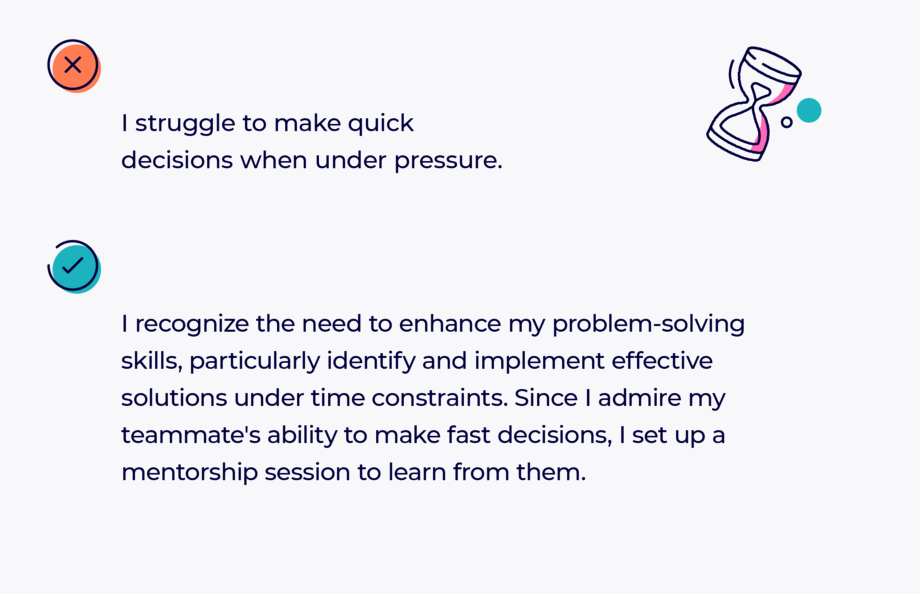
Quality of Work Performance Review Examples
Your work quality reflects your expertise, skill, professionalism and overall success in your position (and is likely to be reviewed in a self-evaluation).
When responding to quality of work questions, think about how you used attention to detail and commitment to excellence to achieve great results.
Phrases of Accomplishment
- “I actively sought and applied feedback to enhance the quality of my work, leading to continuous improvement in my deliverables.”
- “I paid meticulous attention to detail, ensuring accuracy and precision in all aspects of my assignments.”
- “I successfully met project goals while maintaining a high level of quality, showcasing my ability to balance efficiency with thoroughness.”
- “I actively sought out opportunities for professional development to stay updated on industry best practices, contributing to the overall improvement of the team’s output.”
Phrases of Improvement
- “I recognize that there were instances where I could have improved the quality of my work, and I am actively seeking feedback to identify specific areas for enhancement.”
- “I am refining my attention to detail to ensure that all aspects of my work meet the highest standards of accuracy and precision.”
- “I understand the importance of thorough research in maintaining high-quality work, and I am actively seeking to enhance my research skills in areas where improvement is needed.”
- “I am committed to setting aside dedicated time for thorough reviews and revisions to catch potential errors and improve the quality of my deliverables.”
Project Management Examples
Your project management skills prove that you can organize tasks and allocate your time and resources effectively to complete projects within deadlines.
As you reflect on your project management skills, think about the times when you executed a project successfully through time management, coordination and effective communication
Phrases of Accomplishment
- “I successfully led cross-functional teams in the completion of projects, ensuring we completed all tasks on time and within scope.”
- “I effectively utilized project management tools to plan, monitor and control project timelines, resulting in successful project deliveries.”
- “I actively communicated project progress to stakeholders, keeping them informed and addressing any concerns promptly.”
- “I demonstrated strong organizational skills, creating and maintaining detailed project plans that contributed to the team’s overall success.”
Phrases of Improvement
- “I am working on improving my communication with team members and stakeholders to provide more frequent and transparent updates on project progress.”
- “I understand the importance of risk management in project execution, and I am actively seeking ways to improve my ability to identify and mitigate potential risks.”
- “I acknowledge that there were instances where we didn’t meet project timelines, and I am implementing strategies to improve my time management and prioritize tasks more effectively.”
- “I am seeking feedback from team members to identify areas where I can improve collaboration and teamwork in project settings, and I am committed to making adjustments based on that feedback.”
Leadership Abilities Examples
Whether you’re seeking a leadership role or not, management will likely ask you how well you lead others. Leadership can include leading yourself and others as you inspire unique solutions, foster collaboration and take initiative.
Think about how you were able to use your leadership skills to support the achievements of your team and the organization.
Phrases of Accomplishment
- “I demonstrated strong decision-making skills, providing clear direction and guidance to the team last week in our brainstorming session.”
- “I actively facilitated effective communication within the team, ensuring that everyone felt heard and understood.”
- “I successfully delegated tasks based on team members’ strengths, leading to improved efficiency and overall project success.”
- “I led by example, embodying the values and work ethic I expected from my team, which positively influenced our collective performance.”
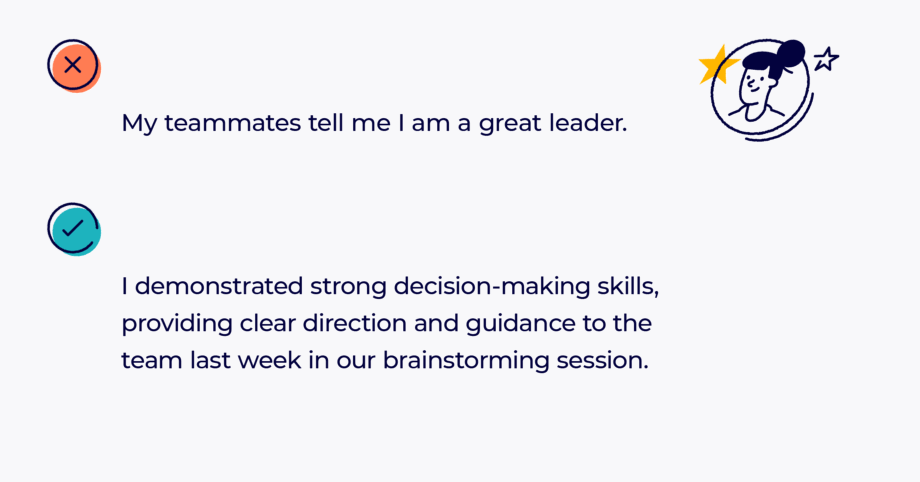
Phrases of Improvement
- “I recognize the need to enhance my delegation skills, and I am actively working on better understanding the strengths and weaknesses of each team member to assign tasks more effectively.”
- “I am working on providing more constructive feedback to team members that is both helpful and motivating.”
- “I understand the importance of fostering a more inclusive team culture, and I am actively seeking ways to ensure that all team members feel valued and heard.”
- “I acknowledge that there were instances where I could have communicated more effectively during challenging situations, and I am working on improving my crisis management and communication skills.”
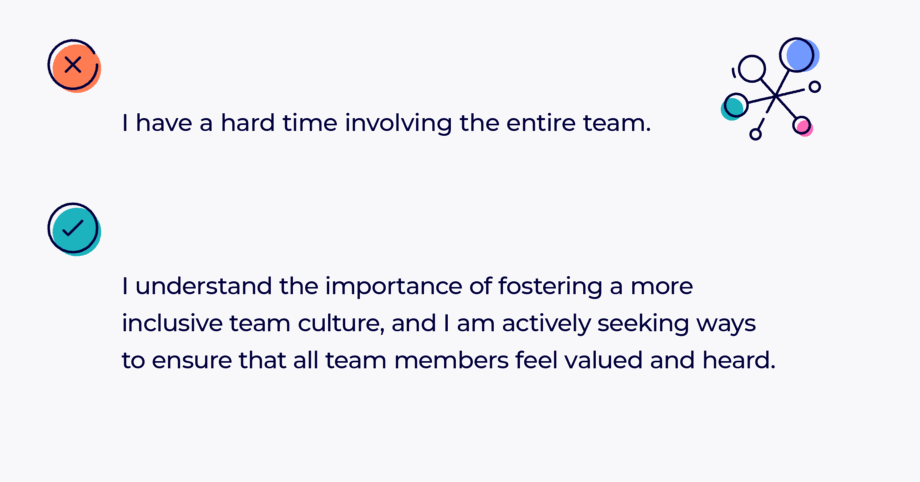
The Purpose of Self-Evaluations
I believe that great self-assessments act as a powerful tool to help you discover who you are, who you’d like to become and how to get there.
When self-evaluation is done right, you can:
- Prepare your thoughts for performance reviews
- Determine your progress
- Align yourself with the organization
- Set future goals
- Define essential areas of improvement
- Highlight your strengths
- Identify abilities and skills that may be going unused
- Discover areas where you can help and train others
- Demonstrate accountability
7 Tips for Writing an Honest Self-Evaluation
A great evaluation that will achieve the above outcomes is specific, detailed and most importantly – honest.
But if you’re new to writing evaluations, you may have no idea where to start.
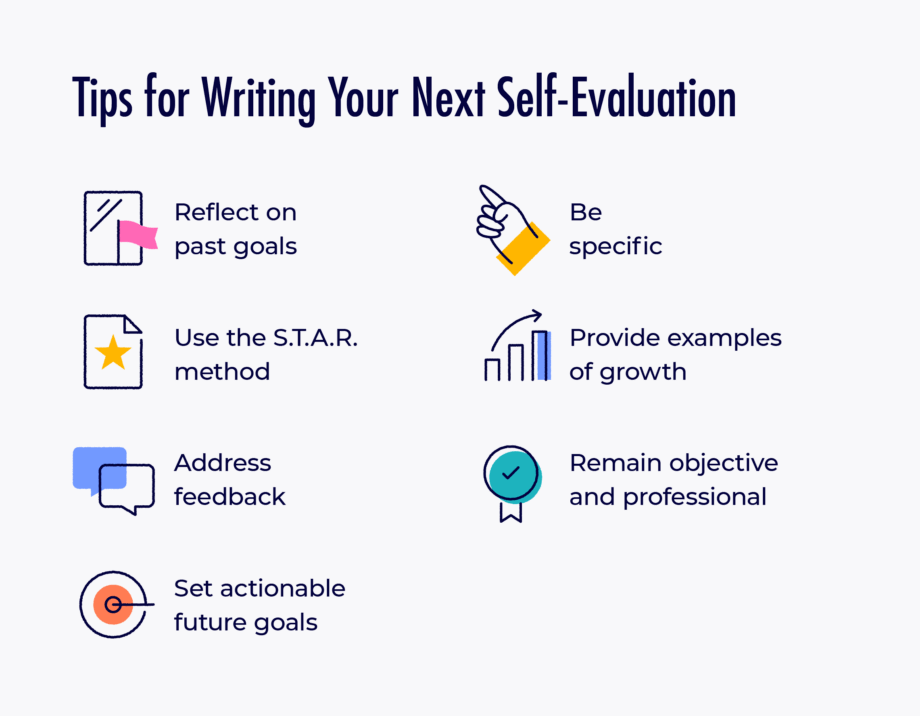
Here are seven things to do while writing your self-evaluation:
- Reflect on past goals. Ask yourself, “Did I achieve any of my past goals?” If you did, call them out in your evaluation and the results of achieving your goals. If not, make a game plan for how you will accomplish your goals next time.
- Be specific. A vague self-evaluation benefits no one. Give examples. Use detail. If there’s a problem, share the very root of it. The more details you offer, the more you and your manager will learn from it.
- Use the S.T.A.R. (Situation, Task, Action, Result) method. With the S.T.A.R. method, you will provide a concise yet comprehensive overview of your experiences.
A S.T.A.R. answer may look something like, “Last month, I was working on X project, and I had an extremely tight timeline. I immediately scheduled a team meeting to see if any members were willing to share the workload. I was fortunate enough to have two members take on some of the work. Through delegation and constant communication, we completed all of the work on time and exceeded the client’s expectations.”
- Provide examples of growth. When evaluating yourself, don’t forget to mention areas where you’re actively growing and improving. Even if that skill isn’t perfect, the work you’re putting into it is always worth mentioning.
You may say something like, “I’ve noticed a significant improvement in my project management skills. Since my last review, I’ve been able to successfully manage and schedule 12 projects and turn them in on or ahead of schedule.”
- Address feedback received. Chances are, you’ve been on the receiving end of feedback a few times, even between evaluation periods. Don’t be afraid to mention some of that feedback in your evaluation and what you did or are doing to improve.
For example, you could add something like, “My coworker mentioned that she feels I don’t make myself available enough to address questions she has about project details. To remedy this, I am implementing an open door policy for three hours a day to make myself available for anyone to come to me with questions.”
- Remain objective and professional. You must provide an honest and constructive assessment throughout your evaluation. To remain objective, remember to use a neutral tone, refrain from being defensive, avoid using personal opinions and be transparent.
Practicing professionalism and objectivity will demonstrate self-awareness and commitment to growth — two characteristics your employer looks for in these reviews.
- Set actionable future goals. Most self-evaluation forms will already have a section where you’ll write down future goals. And while a goal can be as simple as “I want to improve my collaboration skills,” it’s not necessarily effective if you don’t also write down your game plan.
Instead of the previous goal, you could write, “I want to improve my collaboration skills by being more open to my coworker’s ideas when I am looking for inspiration. For my next few projects, I will message our team chats with a brief project synopsis and see if anyone would like to lend ideas to or collaborate with me on the project.”
Key Benefits of Self-Evaluations
With so much already on your plate, you may wonder, ”Why should I complete a self-evaluation when my boss is already reviewing my performance?”
You’d be surprised by how many times I’ve heard those words.
To me, a self-evaluation is much more than a review of your performance. It’s a time for self-reflection to understand how far you’ve come and see where you’re going.
It’s a visual representation of who you are and who you want to be.
I can personally testify that the results of self-evaluations are tremendous when taken seriously. Here are the top four benefits I often see from those who conduct honest self-reviews.
1. Increases Self-Awareness
When you evaluate yourself, you might find that you can better recognize your work style, preferences, values and more. As you learn more about yourself as an employee, you can enhance your skills, improve workplace relationships and set yourself up for success.
2. Accomplishes Realistic Goal Setting
No one can set a realistic goal for you the way you can. While a manager or coworker can help you create a goal, you’re the only person who truly knows what you can accomplish (and your limits on accomplishing it). A truthful self-evaluation can help you clarify your priorities, instill a sense of direction and create a plan to help you achieve your goals.
3. Opens a Line of Communication and Feedback
Self-evaluations should always be conducted before the manager review. Doing this allows for more open discussions during the review process and facilitates a mutual understanding of feedback on strengths, weaknesses, expectations, opportunities and more.
4. Encourages Accountability and Ownership
Individuals who regularly participate in self-evaluations show accountability for their actions and outcomes. Encouraging employees to reflect on their past actions, achievements, strengths and weaknesses can help them learn more about how their work impacts those around them.
Growth and Success at Awesome Motive
If you’re looking for a place to grow and work with incredible humans, Awesome Motive may be the place for you. At Awesome Motive, we encourage and support you in reaching your fullest potential. Through powerful leadership and goal-setting tools like self-evaluations and frequent reviews, we believe in setting up our employees for success — whatever that looks like to them.
If you are committed to excellence and ready for a workplace that has a big vision and wants to see you win in it, check out our job openings at Awesome Motive today.
To achieving success through growth and learning,
Thomas







Leave a Reply